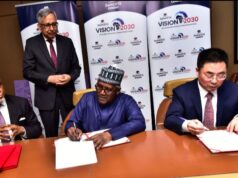
Global experts have suggested the use of Islamic Finance to serve as a strong and non-traditional source of financing the Sustainable Development Goals (SDGs) across the world.
This position was canvassed at a seminar organized by the Islamic Development Bank (IDB), on the sidelines of the United Nations’ Third International Conference on Financing for Development which began yesterday in Addis Ababa, Ethiopia.
The seminar, entitled “Mobilizing Non-traditional Sources of Finance to Achieve Sustainable Development Goals (SDGs): The Role of Islamic Finance,” had as panelists, Dr. Savas Alpay, Chief Economist, IDB, who represented the IDB President, Dr. Ahmad Mohamed Ali; Dr. Mahmoud Mohieldin, Corporate Secretary & President’s Special Envoy, World Bank Group, Dr. Sami AlSuwailem, Manager of the Islamic Financial Products Development Centre, IDB; Dr. Ayo Ajayi, Director, Africa Team, Bill & Melinda Gates Foundation and Mr. Johannes Majewski, Program Coordinator, GIZ.
Dr. Savas Alpay, said that the SDGs, which contain 17 goals and 169 targets, and are expected to replace the Millennium Development Goals (MDGs), could address major global challenges and promote financial inclusion, especially to the under-privileged segment of the society.
He called on world leaders to move faster, take strong and decisive actions in order to fulfil the commitments made by governments and international agencies for the implementation of the SDGs.
“Islamic finance has footprint in Asia and Middle East, is ripe for growth in South America and Europe and has future markets in North America, Central Asia and Australia. Its global assets have grown considerably and are estimated to have reached US$1.8 trillion by 2014 with compounded annual growth rate of about 15-20 percent,” the Chief Economist said.
Dr. Savas Alpay reassured the participants that IDB is a pioneer in initiating innovative means of Islamic finance, and the instruments applied in this mode of financing have the potential to address key targets of the SDGs, such as food security, provision of shelter, building infrastructure, providing sustainable energy and ensuring financial inclusion.
He added that Islamic financial instruments like Sukuk (Islamic capital market instruments), could be utilized as an effective non-traditional means of mobilizing resources for the implementation of the SDGs.
Dr. Alpay said that IDB has used such instruments in funding a number of short term and long term development activities.
Dr Sami Alsuwailim of the IDB said that the concept of Islamic finance is a participatory system of financing and that its core principles are accepted globally, irrespective of faith or nationality.
In his intervention during the panel discussion, Dr. Mahmoud Mohieldin of the World Bank, said that there are several advantages provided by Islamic financial services, and that is why the World Bank is paying significant attention to them. He said that during the financial crisis, the World Bank noticed that Islamic financial institutions developed some resilience, and because of the provisions of Islamic law that prohibit certain types of transactions like gambling and speculation, Islamic finance is linked with the real economy and prevents institutions from accumulating debt beyond reason.
Dr. Ayo Ajayi of the Gates Foundation dwelt on the innovative financing mechanisms introduced between IDB and his institution, adding that these mechanisms will enable low income countries to access financing through the $2.5 billion Lives & Livelihoods Fund, established by IDB and the Gates Foundation.
He said that this shows the enormous potential of Islamic finance which can be harnessed in mobilizing resources for the actualization of the SDGs.
Mr. Johannes Majewski, Program Coordinator, GIZ, the German Corporation, extolled the strength of Islamic finance through its emphasis on asset based financing and its focus on common welfare.
“There are 650 million Muslims living on less than $2 a day and having no access to formal finance.”
But the contribution of Islamic finance to the SDGs according to Mr Majewski, is that it has the ability to reach the unbanked segment of the population.
Meanwhile as part of its commitment to the SDGs, the IDB announced that it will increase its funding of SDG related activities through its ten year strategic framework, from $80 billion recorded during the MDGs, to $150 billion over the next 15 years (2016-2030).
The Islamic Development Bank is a multilateral development institution with headquarters in Jeddah, KSA. It consists of 56 member countries in Africa, Asia, Europe and Latin America.
The purpose of the bank is to foster the economic development and social progress of Muslim countries, and Muslim communities in non-member countries. The Bank has regional offices in Kuala Lampur (Malaysia), Rabat (Morocco), Almaty (Kazakhstan), Dakar (Senegal), and several gateway offices and field representatives in different parts of the world. [myad]






